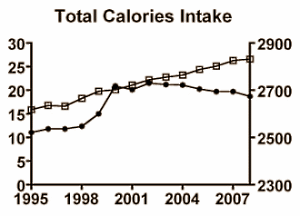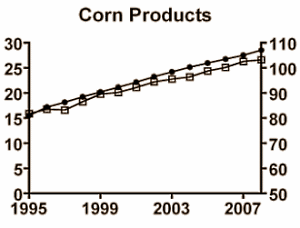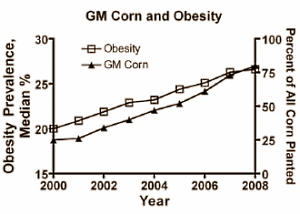Maakt gentechmaïs de Amerikanen zo dik?
Het genetisch verknutselen van maïs levert een bijdrage aan het alsmaar dikker worden van de bewoners van deze aardbol. Die hypothese formuleren statistici van de University of Toledo in Nutrition Research and Practice.
Verzet tegen genetisch versleutelde gewassen als gentechsoja en gentechmaïs is in de kringen van MMM's [Mensen Met Macht - red.] nog steeds synoniem met domheid en irrationalisme. Wie geen gentechvoedsel op zijn bord wil, is gewoon te dom om te begrijpen dat gentechnologie onschuldig is en nuttig.
Volgens de MMM's moeten de domme massa's worden voorgelicht, zodat ze begrijpen dat genetisch gemanipuleerde maïs 'gewoon' maïs is waar genetisch ingenieurs een gen uit de bacterie Bacillus thuringiensis hebben ingebouwd. Dat Bt-gen laat genmaïs zijn eigen insecticide aanmaken, waardoor hij beschermd is tegen insecten die de plant aanvreten. Dat insecticide is onschadelijk voor mensen, en verhoogt de opbrengst van de boer.
Geen vuiltje aan de lucht, dus.
Volgens onderzoekers van de de University of Toledo is dat nog maar de vraag. Zij legden Amerikaanse cijfers over de opkomst van overgewicht naast gegevens over de consumptie en productie van voedsel. Ze zagen dat de gemiddelde Amerikaan sinds 1995 weliswaar gestaag dikker is geworden, maar sinds 2000 minder is gaan eten.
De onderzoekers vonden ook een verband tussen aan de inname van maïs en vetzucht. De relatie tussen die twee is bijna 1 op 1.




Toen de onderzoekers nagingen hoeveel procent van de verbouwde maïs in de VS genetisch verknutseld is, ontstond de figuur hierboven. De stijging van het aantal obese mensen in de VS houdt gelijke tred met het verdwijnen van de normale maïs op het Amerikaanse platteland.
De onderzoekers stellen dan ook voor om nog eens nader naar gentechmaïs te kijken. "These observations prompted us to hypothesize that consumption of GM corn products may contribute to rising obesity trends", schrijven ze. "We speculate that the bacterial antigen derived from the Bacillus thuringiensis (Bt) entomocidal crystalline protein protoxin, which is genetically engineered into corn to confer resistance to insect pests, may be the underlying culprit that causes anomalous adipose tissue dysregulation and obesity development."
"The implications of our results and the new hypothesis raised here are provocative but testable, as the effects of GM corn products can be assessed in molecular and animal models of obesity."
Bron:
Nutr Res Pract. 2011 Jun;5(3):253-9.
Maakt gentech-maïs de Amerikanen zo dik?
Het genetisch verknutselen van maïs levert een bijdrage aan het alsmaar dikker worden van de bewoners van deze aardbol. Die hypothese formuleren statistici van de University of Toledo in Nutrition Research and Practice.
Verzet tegen genetisch versleutelde gewassen als gentechsoja en gentechmaïs is in de kringen van MMM's [Mensen Met Macht - red.] nog steeds synoniem met domheid en irrationalisme. Wie geen gentechvoedsel op zijn bord wil, is gewoon te dom om te begrijpen dat gentechnologie onschuldig is en nuttig.
Volgens de MMM's moeten de domme massa's worden voorgelicht, zodat ze begrijpen dat genetisch gemanipuleerde maïs 'gewoon' maïs is waar genetisch ingenieurs een gen uit de bacterie Bacillus thuringiensis hebben ingebouwd. Dat Bt-gen laat genmaïs zijn eigen insecticide aanmaken, waardoor hij beschermd is tegen insecten die de plant aanvreten. Dat insecticide is onschadelijk voor mensen, en verhoogt de opbrengst van de boer.
Geen vuiltje aan de lucht, dus.
Volgens onderzoekers van de de University of Toledo is dat nog maar de vraag. Zij legden Amerikaanse cijfers over de opkomst van overgewicht naast gegevens over de consumptie en productie van voedsel. Ze zagen dat de gemiddelde Amerikaan sinds 1995 weliswaar gestaag dikker is geworden, maar sinds 2000 minder is gaan eten.
De onderzoekers vonden ook een verband tussen aan de inname van maïs en vetzucht. De relatie tussen die twee is bijna 1 op 1.




Toen de onderzoekers nagingen hoeveel procent van de verbouwde maïs in de VS genetisch verknutseld is, ontstond de figuur hierboven. De stijging van het aantal obese mensen in de VS houdt gelijke tred met het verdwijnen van de normale maïs op het Amerikaanse platteland.
De onderzoekers stellen dan ook voor om nog eens nader naar gentechmaïs te kijken. "These observations prompted us to hypothesize that consumption of GM corn products may contribute to rising obesity trends", schrijven ze. "We speculate that the bacterial antigen derived from the Bacillus thuringiensis (Bt) entomocidal crystalline protein protoxin, which is genetically engineered into corn to confer resistance to insect pests, may be the underlying culprit that causes anomalous adipose tissue dysregulation and obesity development."
"The implications of our results and the new hypothesis raised here are provocative but testable, as the effects of GM corn products can be assessed in molecular and animal models of obesity."
Bron:
Nutr Res Pract. 2011 Jun;5(3):253-9.
Maakt gentech-maïs de Amerikanen zo dik?

Comment